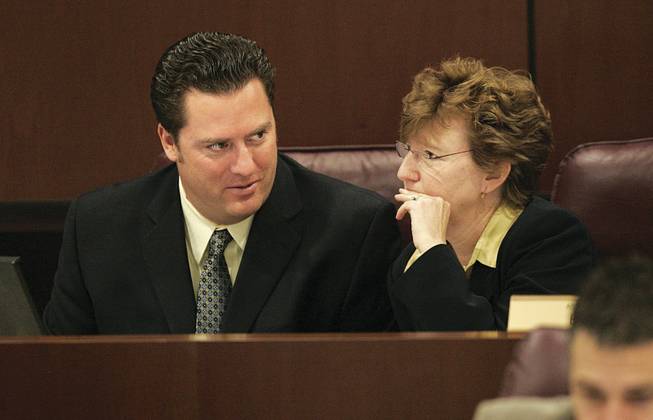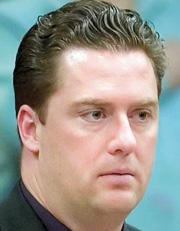
Sam Morris / Las Vegas Sun
Democratic Assemblyman John Oceguera, assuming he’ll be the next speaker, has a tough act to follow: the formidable Barbara Buckley, right.
Sunday, March 21, 2010 | 2 a.m.
Sun coverage
John Oceguera is no Barbara Buckley.
It must be an annoying refrain for the presumed next speaker of the Nevada Assembly to hear, although he’ll have to get used to it.
Buckley, the Democratic speaker who will lose her seat this year to term limits, has been a political powerhouse who commanded respect and fear among other players in the legislative process.
Oceguera has to fill shoes that are roughly the size of a clown’s. He’ll be doing so while trying to close a $3 billion budget gap and negotiating with the Senate as it redraws congressional and legislative districts following the decennial census.
The differences between Buckley, the state’s first female speaker, and Oceguera are becoming apparent — for better and for worse, say lobbyists and Oceguera’s fellow Democrats inside and outside the Legislature.
The first signs of the new regime are showing up in a number of competitive Assembly Democratic primaries, where Oceguera and his team were either unable or unwilling to clear the field, which is usually preferable so the candidate and party can husband resources for the general election fight against the other party.
A Democratic operative griped that competitive primaries would have been unthinkable under Buckley, who often used her network to find likely winners and make sure they faced no Democratic opposition.
“Really? You have that many primaries?” said the source, who was granted anonymity to speak freely.
A Democratic lobbyist added: “You would think he’d want to have his choir singing off the same sheet of music.”
In Assembly districts 7, 14, 15, 19 and 31, Democrats, who hold a veto-proof 28-14 majority, either did not endorse or did not clear the field for their endorsed candidate. Other districts are less competitive but still have more than one Democrat on the ballot.
Although legislators and lobbyists agreed that Buckley may have prevented quite so many primaries, they also defended Oceguera.
A combination of term limits, members deciding to run for other offices and a member not running for re-election have created 12 open seats that Democrats must defend, an unprecedented number compared with recent years. Meanwhile, they must also help incumbents and try to pick off Republican seats.
Managing the process is a huge challenge involving recruiting candidates, raising money and building organizations — and Oceguera wins praise from his colleagues for taking it on adroitly.
Democrats began recruiting in December 2008. Fresh off the wave of party activism that elected President Barack Obama, candidates came out of the woodwork, Assemblywoman Debbie Smith said. This made it hard to prevent primaries.
“The good news is, you have a lot of people interested in running. The bad news is, you have a lot of people interested in running — it creates a contentious field,” she said.
Smith noted that she’s learned in conversations with legislators from other states that contested primaries are not uncommon when term limits are in effect. The high turnover creates a sense of possibility for more people and deepens the pool of the politically ambitious.
For his part, Oceguera said the challenge has been enormous, but the caucus is on track to execute its plan. He selected a committee to make final decisions.
After recruiting potential nominees, they put the candidates through a rigorous endorsement process, including group and one-on-one interviews — a first, as Assembly Democrats haven’t traditionally endorsed in primaries.
In cases where they decided not to endorse, they either could not reach consensus, or liked both candidates and wanted to see which one performed better in the primary, allowing it to serve as a kind of testing ground, Oceguera said.
As for grumblings from some who feel Oceguera tried unsuccessfully to shove candidates aside, he said, “We didn’t discourage or encourage anyone. We let them know we were going to put all our infrastructure behind the candidates we endorsed. But we never suggested someone not run.”
Oceguera said the long process led to a valuable dialogue among incumbents and his new charges about politics, policy and the legislative process, which will better prepare the caucus for the 2011 Legislature.
Whether that assertion is true remains to be seen, but there’s little doubt among lobbyists and legislators that next session will be different from the recent past, which was dominated by Buckley — she was a powerful majority leader before becoming speaker. And, the electoral season, with its contentious Democratic primaries, is viewed as a signal of what’s to come.
“It’s just the beginning of indications that Oceguera will not be able to sustain what Speaker Buckley achieved,” a prominent lobbyist said.
There was a touch of elation in his voice, as he marveled at Buckley’s ability to win 28 votes on even minor procedural matters.
“It’s a return to democracy,” he quipped.
Much of the change will have nothing to do with Oceguera’s leadership capabilities, however.
He’ll face term limits after the next session, which means as soon as he accepts the gavel, he’ll be a lame duck, which could inspire immediate independence among members of his caucus.
Many candidates to fill the open Democratic seats appear to be of a different stripe, with idealism, ideology and ambitious independence winning out over pragmatism and dues paying, a number of legislative observers said.
Also, with term limits allowing members just 12 years in an office, any with ambition will begin jockeying for future leadership roles as soon as they are elected. This could lead to more legislators striking out on their own as mavericks, or bucking Oceguera and forming alliances with more junior members with an eye to future sessions.
Smith, who will be a top lieutenant to Oceguera, acknowledged that Buckley is a tough act to follow, but she said Oceguera is up to it: “John is a strong leader. He and our caucus have raised money and recruited candidates. We hung together in the special session, and he’s been working overtime trying to develop our caucus, build a good team and have us ready.”
There’s no extra pay for overtime, so Oceguera will have to grin and bear it.


Join the Discussion:
Check this out for a full explanation of our conversion to the LiveFyre commenting system and instructions on how to sign up for an account.
Full comments policy